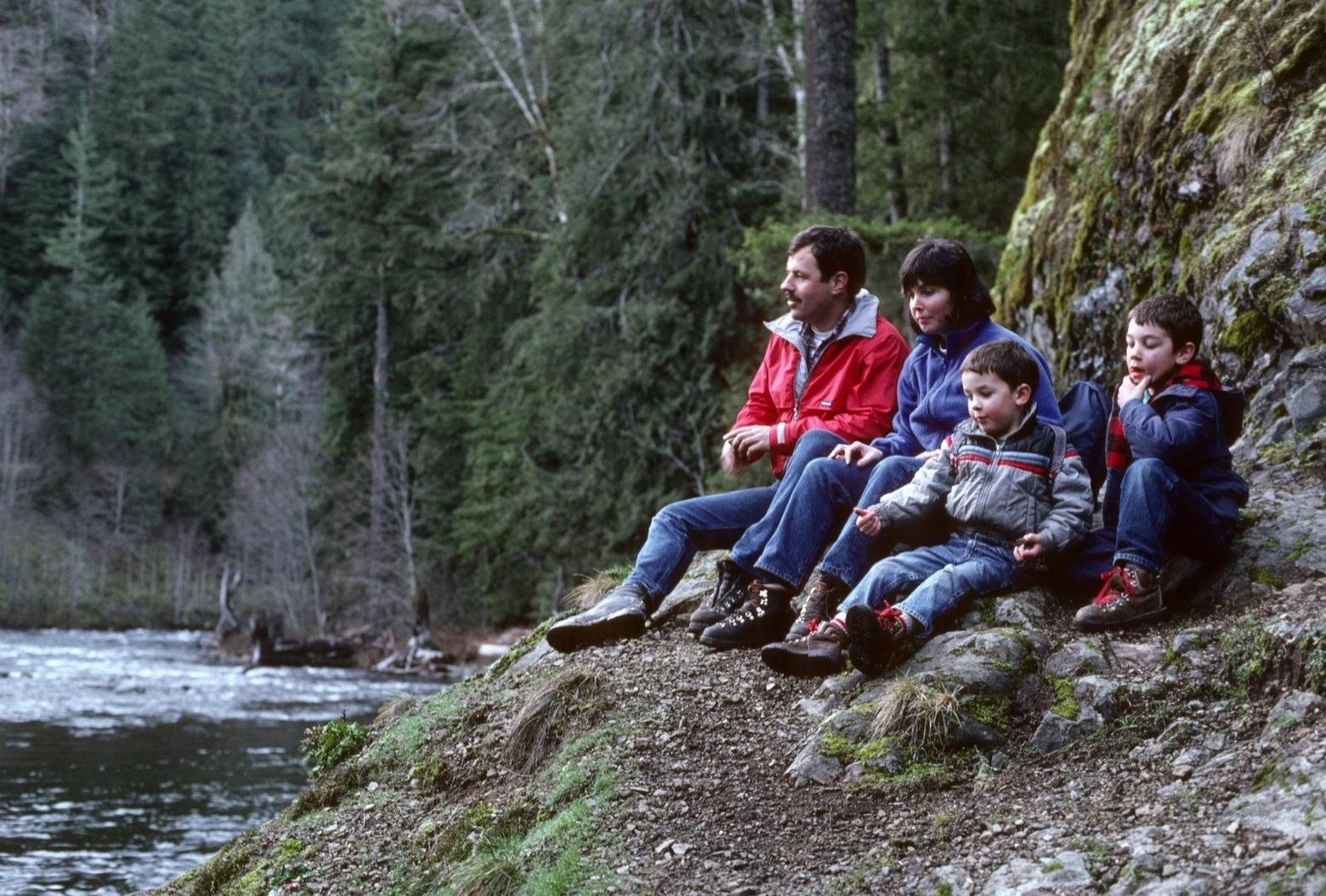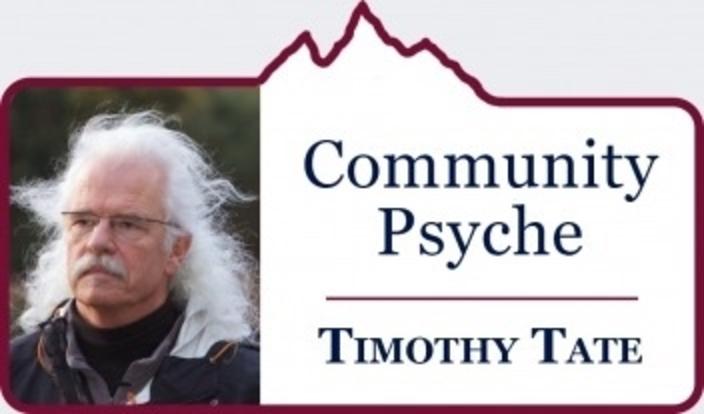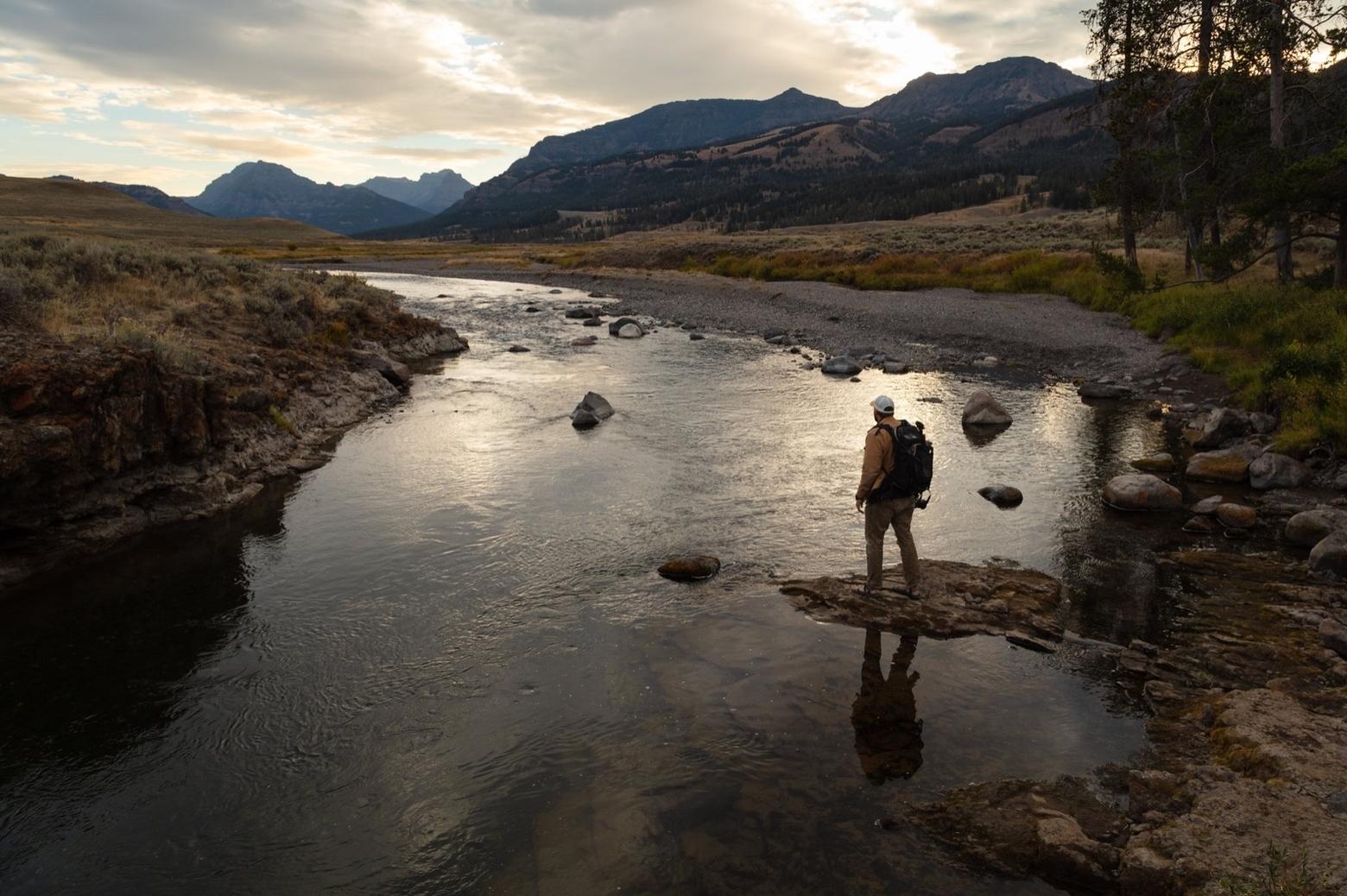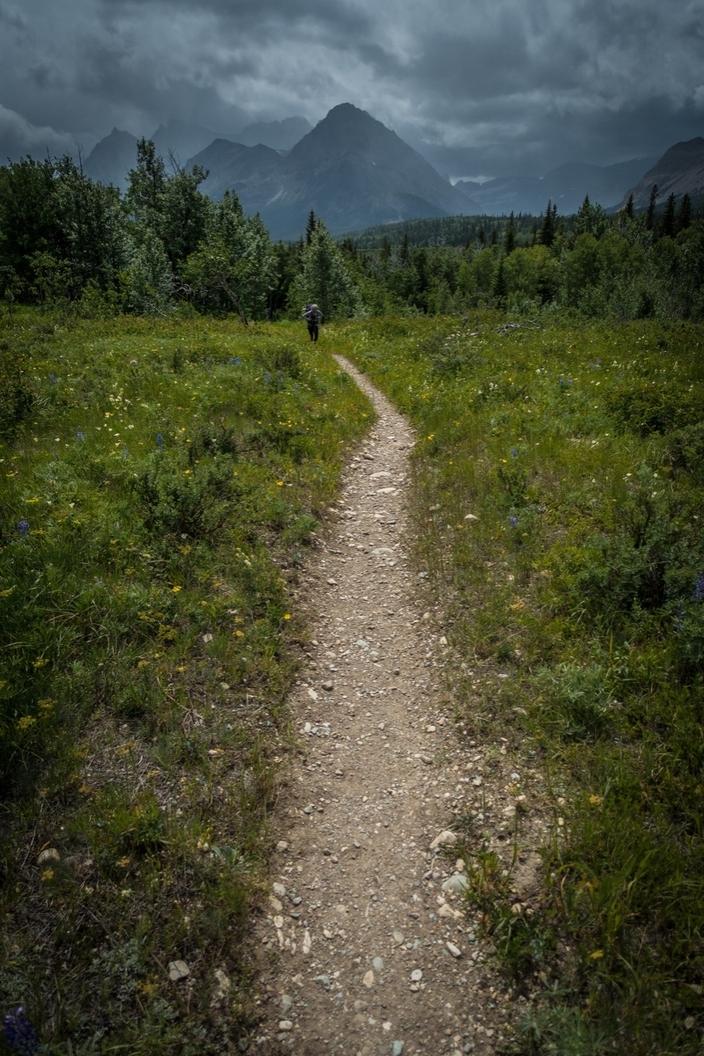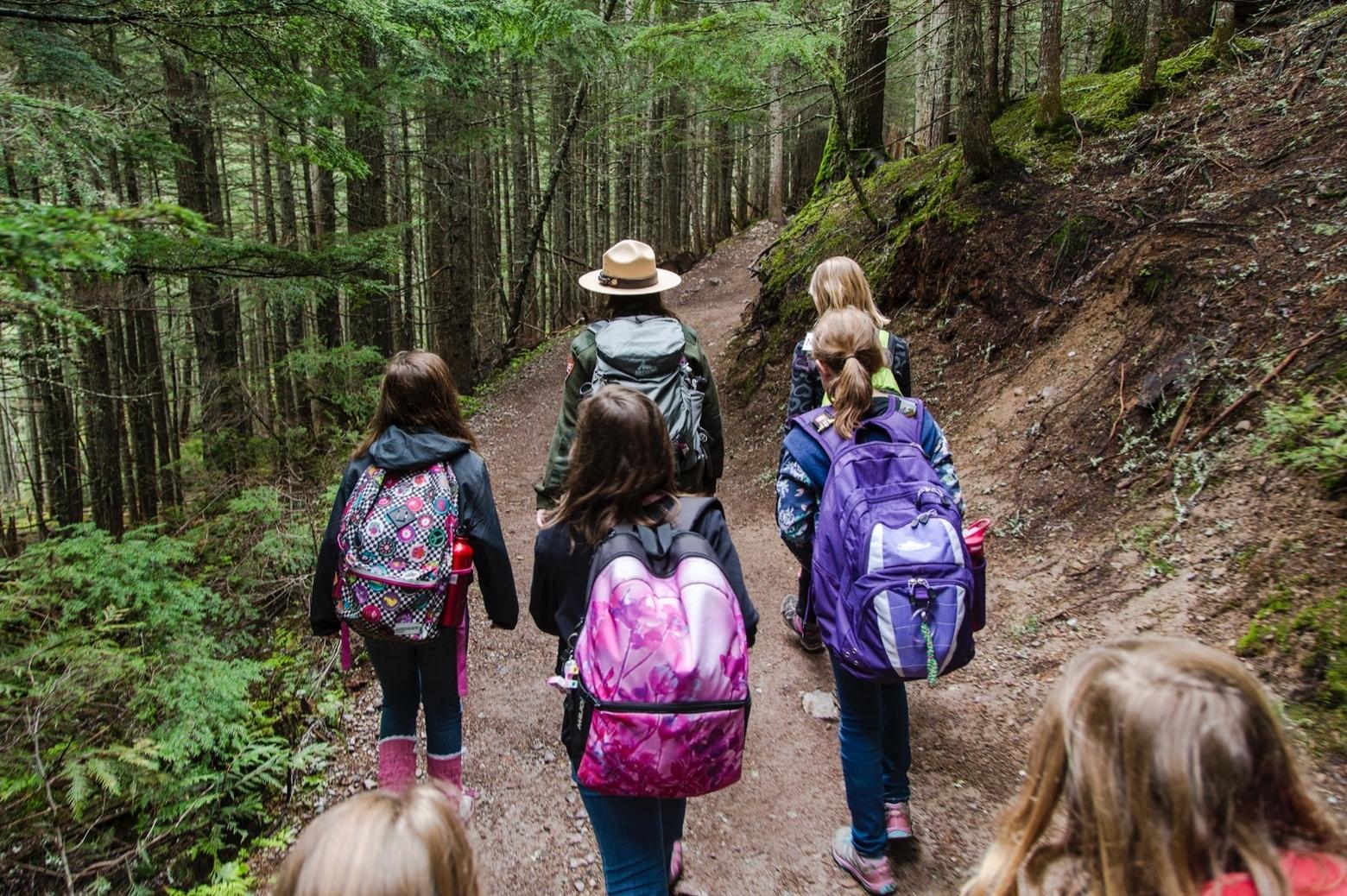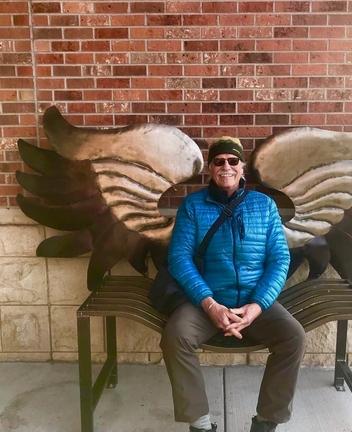Back to StoriesCurbing Our Egos In All Ages
I love the energy of this, and yet I balk at it—the self-centered focus that seems so common—when a specimen fitting the description above blasts by me without warning, pedaling a mountain bike on Sourdough Trail or Peets Hill, coming within inches of knocking me on my back as if I am in their way.
Similarly, I often pass the blue and black dog poop bags littering the shoulders of trails waiting for Godot to arrive; I wonder who the owners of those canines who made the contents believe will carry them to the smelly bin?
Getting out into nature is as satisfying to me today as it was 50 years ago. Solitary hikes fill me like sun warms the heart. I feel the sound of tumbling water along the trail echoing off moss-covered granite walls as an adult lullaby. This sensation combined with feeling small in such whispering immensity yields a perspective that tames the worries knocking around in my gasping ego.
Community means being part of a larger whole, the same as in nature every part is important but none dominates another. The only exception has been we humans seeking conquering dominion over everything. The hardest thing I see in many clients, especially those of younger persuasion, is the belief that the world revolves around them and their immediate desires, 24-7. Very few ponder a world without them being in it. I struggled with this hubris too when I was their age.
Sadly, we dwell in a time in which many youth chastise the old, though ancient cultures around the world, including indigenous nations close to us, still hold reverence for the wisdom of elders that is hard earned. Unlike the young, elders have gained perspective through their longevity.
Our sense of purpose changes over our lifespan. Each stage of life has its own existential tasks and challenges. What is sorely missing in our valley is the appreciation of and the seeking out of such elders. When youthful exuberance is the premium, old is the cast off. And granted, growing old in a mountain valley does take its toll.
Every day I see a frail yet determined man walk by my office down Mendenhall at the same time. I see him, strong in his ranch hand body, tilting forward a bit to compensate for his alcohol-induced bobbing and weaving. Old is what happens when you have lost your purpose and sense of meaning, be you 35 or 85.
The task of elder in our mountain town is to set an example of aging with grace; part of that is staying engaged. As a child I had a terrible fear of death and eternity. Did my preacher father and submissive missionary mother contribute to that fear? Well, yes.
Later in life my brush with stage three prostate cancer revived that childhood trauma. But guess what, the ego is what is threatened by aging, by dying and death. Our soul, if I can use such a charged word in a humanistic way, finds meaning elsewhere. She finds meaning in losing control of the neurotic death grip. She finds joy in respect of the natural world. She, since the soul is feminine, takes refuge in reveling in how she is an aspect of all creation, not separate from It.
What those in their prime sometimes forget is that the old were once young, and that those people when in their 20s, 30s and 40s stepped up to protect places they knew they might never use or use up. I’m looking forward to great things from the younger generation. I wish I could be here to hear them reflect in old age what they were willing to give up in order to keep the soul of their community special.
June 23, 2019
Curbing Our Egos In All AgesWhy is it so hard for younger folk to embrace restraint in our consumption of nature? Is a new form of 'athletic Manifest Destiny' upon us? Timothy Tate ruminates.
That “youth is wasted on the young,” an adage oft-attributed to George Bernard Shaw or Oscar Wilde, is a riddle made more poignant with age. But let’s flip that notion; sometimes I wonder if age is wasted on the elderly.
I will start first with critical self-examination: Am I elderly at seventy-one?
The answer would be yes when I think back to what I thought of people in their 70s when I was a fearless twentysomething. To me, then, septuagenarians seemed ancient.
The year I was born, the average life expectancy for a man in this country was 64.6 years; for a woman, 69.9 years.
I will start first with critical self-examination: Am I elderly at seventy-one?
The answer would be yes when I think back to what I thought of people in their 70s when I was a fearless twentysomething. To me, then, septuagenarians seemed ancient.
The year I was born, the average life expectancy for a man in this country was 64.6 years; for a woman, 69.9 years.
By that outlook, it would put me today on borrowed time.
What is age, anyway, but an attitude tied to a number in search of meaning in a youth-oriented society?
What is age, anyway, but an attitude tied to a number in search of meaning in a youth-oriented society?
Arguably, no mass of people in America are more youth-oriented than those who gather in outdoor-oriented communities where exposure to nature is considered an elixir for achieving eternal youth. Each of our lives, no matter where we call home, involves a series of transitions. Much of my work as a therapist involves helping people navigate their individual journeys stretching from cradle to grave, involving rites of passage, interpersonal relationships, triumphs, setbacks, disappointments, personal loss, physical injury, mental illness and end of life, which is unavoidable.
Though some might think or behave otherwise, none of us is immortal.
° ° °
To me, one of the important levels of awareness that many “old people” achieve is being able to value how things could still be even after we are gone. Ego perishes in death, so does arrogance and bravado, but the positive deeds we did for others can live forever. In mountain towns, one of those deeds is striving to leave your community and the land around it in as fine or better condition as you found it. This involves taking less than you give back.
What sets Bozeman and Jackson Hole, Cody, Red Lodge, Livingston and other towns in Greater Yellowstone apart is the caliber of our wildlands and the pastoral landscapes next to them. They attract high-caliber people. They are home to high-caliber wildlife.
Aging in a mountain valley town where my wife and I have lived since I was 34 adds spice to the mix of how we think about “old.”
Old is one thing if you dwell in a strip-mall-coated suburb focused on materialism; it’s another story if one lives at 4,800 feet above sea level in a community populated by world-class athletes and is rife with extreme sports and expedition-ready fitness folk.
Though some might think or behave otherwise, none of us is immortal.
° ° °
To me, one of the important levels of awareness that many “old people” achieve is being able to value how things could still be even after we are gone. Ego perishes in death, so does arrogance and bravado, but the positive deeds we did for others can live forever. In mountain towns, one of those deeds is striving to leave your community and the land around it in as fine or better condition as you found it. This involves taking less than you give back.
What sets Bozeman and Jackson Hole, Cody, Red Lodge, Livingston and other towns in Greater Yellowstone apart is the caliber of our wildlands and the pastoral landscapes next to them. They attract high-caliber people. They are home to high-caliber wildlife.
Aging in a mountain valley town where my wife and I have lived since I was 34 adds spice to the mix of how we think about “old.”
Though some might think or behave otherwise, none of us is immortal.
Old is one thing if you dwell in a strip-mall-coated suburb focused on materialism; it’s another story if one lives at 4,800 feet above sea level in a community populated by world-class athletes and is rife with extreme sports and expedition-ready fitness folk.
I love the energy of this, and yet I balk at it—the self-centered focus that seems so common—when a specimen fitting the description above blasts by me without warning, pedaling a mountain bike on Sourdough Trail or Peets Hill, coming within inches of knocking me on my back as if I am in their way.
Similarly, I often pass the blue and black dog poop bags littering the shoulders of trails waiting for Godot to arrive; I wonder who the owners of those canines who made the contents believe will carry them to the smelly bin?
Getting out into nature is as satisfying to me today as it was 50 years ago. Solitary hikes fill me like sun warms the heart. I feel the sound of tumbling water along the trail echoing off moss-covered granite walls as an adult lullaby. This sensation combined with feeling small in such whispering immensity yields a perspective that tames the worries knocking around in my gasping ego.
Community means being part of a larger whole, the same as in nature every part is important but none dominates another. The only exception has been we humans seeking conquering dominion over everything. The hardest thing I see in many clients, especially those of younger persuasion, is the belief that the world revolves around them and their immediate desires, 24-7. Very few ponder a world without them being in it. I struggled with this hubris too when I was their age.
Very few are willing or able to to ponder a life in retrospect or having regret for taking something that did not belong to you. It might mean poaching an animal or a new trail or thinking you were getting by with something you knew was wrong but you did it anyway because no one else was watching. And that is, of course, especially with age, where the conscience is there to remind.
As one ages, the wholeness of things often emerges with greater clarity; the focus is not on what I can take or consume in order to self-indulge.
As one ages, the wholeness of things often emerges with greater clarity; the focus is not on what I can take or consume in order to self-indulge.
In Bozeman today I see evidence of self-indulgent behavior that exists at mass scale and it makes me wonder how much the land can absorb.
While out on hikes at slow speed, I play a game speculating on whether I can do my ordinary 6.5-mile hike without encountering a charging dog or human. I think about an incident that happened just the other day when a Newfoundland jumped on me with the trailhead gate in sight.
My “god-damn it” war cry got the attention of the man “walking” his dog obliviously. All I could do was stroll away, hands raised in surrender considering what would have happened to another unsuspecting soul who is not my 6’3”, 205 lbs.
While out on hikes at slow speed, I play a game speculating on whether I can do my ordinary 6.5-mile hike without encountering a charging dog or human. I think about an incident that happened just the other day when a Newfoundland jumped on me with the trailhead gate in sight.
My “god-damn it” war cry got the attention of the man “walking” his dog obliviously. All I could do was stroll away, hands raised in surrender considering what would have happened to another unsuspecting soul who is not my 6’3”, 205 lbs.
The human hiker’s effusive yet half-hearted “sorry, dude" buzzed around me like mosquitoes. In a recent piece that appeared in Mountain Journal, Penelope Pierce of the Gallatin Valley Land Trust shows that I am hardly alone.
° ° °
Have things changed? You tell me.
° ° °
Have things changed? You tell me.
I remember 10 or so years ago when I rode my Specialized mountain bike up to Four-Mile Bridge with our close family friend Kerrie Foote. It seemed a lot simpler here in those days. And I’m not being nostalgic. I would have failed if it weren’t for her encouragement and pace. Comradery, be it hiking, biking or almost anything outdoors, fulfills the promise of mutual support and cooperation that is as old as the trails we tread.
Solitary walks exercise my need for quiet contemplation whereas companionship broadens my perspective through shared effort. And now, in 2019, I have a defensive attitude on the trails, not a welcoming or cooperative one. I admit to having it and it’s been a topic of conversation for many of us. It doesn’t just seem like there are a lot more people; there are a lot more people, a lot more inconsiderate ones and if we’re experiencing this level of angst now where will it be in another decade?
Do and will our public land management agencies like the U.S. Forest Service have the courage to elevate this issue and take action?
Again, I am reminded of Penelope Pierce’s piece in which she wrote, “GVLT and partners will continue to do everything we can to help promote trail etiquette and stewardship, but we need your help. The solution lies within all of us. The culture around how we use and steward our public spaces needs to change. The status quo simply won’t do if we want to continue enjoying theses remarkable trails that add so much to our quality of life.”
° ° °
Trails and pathways are as old as the hills. They are the places where mountain communities like ours converge, across generations. Game trails—the pathways first created by wildlife and followed by our ancestors—led the first indigenous residents to meadows or ridges where game sought refuge.
Often following the lay of the land, these lines wending through the landscape gave us a sense of direction and possibility, informed by wise animal sense.
Pathways become trails that then morphed into wagon rutted roads that flexed into gravel lanes that gave way to hard pack then pavement and onwards to single lane highways, blue roads and freeways. Ecologists say the undoing of any place, unfragmented enough to have sustained the most sensitive of species, began when humans had ambitions on blazing trails.
The ghosts of Manifest Destiny are still alive and well. Today, they take the form of people who feel their purpose is pushing for trails into the last few places that managed to remain remote.
The other day I was taking my weekly constitutional on Pete’s Hill. I was holding back on yelling at dogs charging and bikes flying but did get evoked by four paths wearing into the fragile soil adjacent to the primary walking path and the already “designated” bike path.
I remember Mary Vant Hull, the late citizen advocated for Burke Park trails along with Chris Boyd and Gallatin Valley Land Trust’s Main Street to the Mountains initiative.
Mary wanted to expose people to the wildflowers and beauty of sweet sage and she told users they needed to be mindful of the fragile clay soils. She would admonish walkers or bikers who strayed from the designated paths. She caretook these grounds with a fury befitting an outraged earth mother.
She would sit on one of the trail side benches scorning and/or shaming errant riders who suffer from some delusion of entitlement. We are in desperate need of the next iteration of such righteous rage minding the trails.
Solitary walks exercise my need for quiet contemplation whereas companionship broadens my perspective through shared effort. And now, in 2019, I have a defensive attitude on the trails, not a welcoming or cooperative one. I admit to having it and it’s been a topic of conversation for many of us. It doesn’t just seem like there are a lot more people; there are a lot more people, a lot more inconsiderate ones and if we’re experiencing this level of angst now where will it be in another decade?
Do and will our public land management agencies like the U.S. Forest Service have the courage to elevate this issue and take action?
Again, I am reminded of Penelope Pierce’s piece in which she wrote, “GVLT and partners will continue to do everything we can to help promote trail etiquette and stewardship, but we need your help. The solution lies within all of us. The culture around how we use and steward our public spaces needs to change. The status quo simply won’t do if we want to continue enjoying theses remarkable trails that add so much to our quality of life.”
° ° °
Trails and pathways are as old as the hills. They are the places where mountain communities like ours converge, across generations. Game trails—the pathways first created by wildlife and followed by our ancestors—led the first indigenous residents to meadows or ridges where game sought refuge.
Often following the lay of the land, these lines wending through the landscape gave us a sense of direction and possibility, informed by wise animal sense.
Pathways become trails that then morphed into wagon rutted roads that flexed into gravel lanes that gave way to hard pack then pavement and onwards to single lane highways, blue roads and freeways. Ecologists say the undoing of any place, unfragmented enough to have sustained the most sensitive of species, began when humans had ambitions on blazing trails.
The ghosts of Manifest Destiny are still alive and well. Today, they take the form of people who feel their purpose is pushing for trails into the last few places that managed to remain remote.
The other day I was taking my weekly constitutional on Pete’s Hill. I was holding back on yelling at dogs charging and bikes flying but did get evoked by four paths wearing into the fragile soil adjacent to the primary walking path and the already “designated” bike path.
I remember Mary Vant Hull, the late citizen advocated for Burke Park trails along with Chris Boyd and Gallatin Valley Land Trust’s Main Street to the Mountains initiative.
Mary wanted to expose people to the wildflowers and beauty of sweet sage and she told users they needed to be mindful of the fragile clay soils. She would admonish walkers or bikers who strayed from the designated paths. She caretook these grounds with a fury befitting an outraged earth mother.
She would sit on one of the trail side benches scorning and/or shaming errant riders who suffer from some delusion of entitlement. We are in desperate need of the next iteration of such righteous rage minding the trails.
Entitlement as an attitude is all the rage these days. Dog owners and cyclists are, of course, earth-friendly and conscientious, right? For that matter, aren’t we all?
We know you can love a person, place, or thing to death, but are we willing to admit we’ve reached the point of rationalizing the diminishment of place just to appease our own desire for instant ego gratification?
Surely we are too smart to be short sighted. Surely we have come too far to suffer from terminal myopia. Certainly we understand that once we groove the earth with trails of convenience that invariably expand or “develop” farm land for land grab condos, that for our lifetime, and the foreseeable future, why we are here, is destroyed by our hand. Right?
We are rapidly running out of options with regard to places we desire to take or claim as our own. If we don’t mindfully caretake our valley the next one over the mountain breach will be gone before we get there. There are no more valleys to populate or nearby wildlands holding grizzlies and the diversity of species we have.
The valleys stretching out of sight from Jordan or Ingomar, Montana are fine to settle if you don’t mind brain-numbing winters blanketing an unbroken horizon. Woe for the good people of Lewistown and Dillon who reportedly are seeing people with “6” license plates pulling up stakes here and going there.
The thought that we can’t restrain ourselves, the thought that we must build new paths into the last vestiges of wild nature that remains in order to feel purposeful, leaves me sometimes on the brink of cynical despair. On the one hand as a citizenry we appear well educated, worldly and claim to be eco-friendly but the daily grinding use of our land erodes the landscape like a “mildly” abusive spouse corrodes the confidence of his mate. The landscape of despair has gained ground, expanding its territory where ambivalence and blame fester.
We know you can love a person, place, or thing to death, but are we willing to admit we’ve reached the point of rationalizing the diminishment of place just to appease our own desire for instant ego gratification?
We know you can love a person, place, or thing to death, but are we willing to admit we’ve reached the point of rationalizing the diminishment of place just to appease our own desire for instant ego gratification?
Surely we are too smart to be short sighted. Surely we have come too far to suffer from terminal myopia. Certainly we understand that once we groove the earth with trails of convenience that invariably expand or “develop” farm land for land grab condos, that for our lifetime, and the foreseeable future, why we are here, is destroyed by our hand. Right?
We are rapidly running out of options with regard to places we desire to take or claim as our own. If we don’t mindfully caretake our valley the next one over the mountain breach will be gone before we get there. There are no more valleys to populate or nearby wildlands holding grizzlies and the diversity of species we have.
The valleys stretching out of sight from Jordan or Ingomar, Montana are fine to settle if you don’t mind brain-numbing winters blanketing an unbroken horizon. Woe for the good people of Lewistown and Dillon who reportedly are seeing people with “6” license plates pulling up stakes here and going there.
The thought that we can’t restrain ourselves, the thought that we must build new paths into the last vestiges of wild nature that remains in order to feel purposeful, leaves me sometimes on the brink of cynical despair. On the one hand as a citizenry we appear well educated, worldly and claim to be eco-friendly but the daily grinding use of our land erodes the landscape like a “mildly” abusive spouse corrodes the confidence of his mate. The landscape of despair has gained ground, expanding its territory where ambivalence and blame fester.
The thought that we can’t restrain ourselves, the thought that we must build new paths into the last vestiges of wild nature that remains in order to feel purposeful, leaves me sometimes on the brink of cynical despair.Penelope Pierce observed, “Don’t forget that people new to town, and visitors alike, are looking to you to learn the norms about trail behavior. If the ‘locals’ break the rules, it must not be that big of a deal, right? We can no longer consider ourselves exceptions to the rules; we have to set a good example.”
Sadly, we dwell in a time in which many youth chastise the old, though ancient cultures around the world, including indigenous nations close to us, still hold reverence for the wisdom of elders that is hard earned. Unlike the young, elders have gained perspective through their longevity.
Our sense of purpose changes over our lifespan. Each stage of life has its own existential tasks and challenges. What is sorely missing in our valley is the appreciation of and the seeking out of such elders. When youthful exuberance is the premium, old is the cast off. And granted, growing old in a mountain valley does take its toll.
Every day I see a frail yet determined man walk by my office down Mendenhall at the same time. I see him, strong in his ranch hand body, tilting forward a bit to compensate for his alcohol-induced bobbing and weaving. Old is what happens when you have lost your purpose and sense of meaning, be you 35 or 85.
Old is what happens when you have lost your purpose and sense of meaning, be you 35 or 85.
The task of elder in our mountain town is to set an example of aging with grace; part of that is staying engaged. As a child I had a terrible fear of death and eternity. Did my preacher father and submissive missionary mother contribute to that fear? Well, yes.
Later in life my brush with stage three prostate cancer revived that childhood trauma. But guess what, the ego is what is threatened by aging, by dying and death. Our soul, if I can use such a charged word in a humanistic way, finds meaning elsewhere. She finds meaning in losing control of the neurotic death grip. She finds joy in respect of the natural world. She, since the soul is feminine, takes refuge in reveling in how she is an aspect of all creation, not separate from It.
What those in their prime sometimes forget is that the old were once young, and that those people when in their 20s, 30s and 40s stepped up to protect places they knew they might never use or use up. I’m looking forward to great things from the younger generation. I wish I could be here to hear them reflect in old age what they were willing to give up in order to keep the soul of their community special.
An elder earns their status not by virtue of years accumulated but by a perspective worn smooth by time. This patina shined by experience reflects life without distortion. May those of us who have attained this shine serve as beacons to others who lost in their own exuberance miss the opportunity to take a moment to reflect on our generations to come.
EDITOR'S NOTE: For reference, also read these original stories at Mountain Journal:

